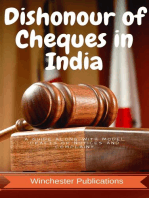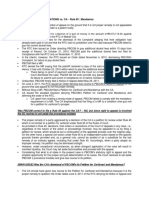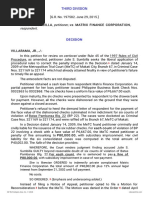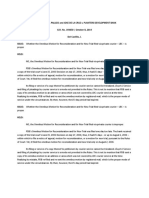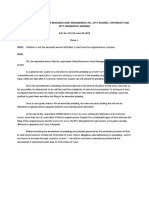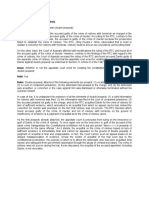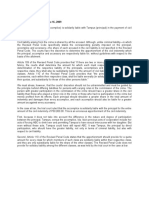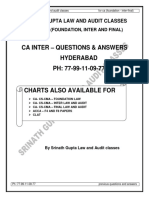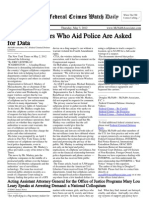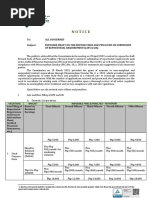AL Ang Network Inc. vs. Mondejar
AL Ang Network Inc. vs. Mondejar
Uploaded by
MACCopyright:
Available Formats
AL Ang Network Inc. vs. Mondejar
AL Ang Network Inc. vs. Mondejar
Uploaded by
MACOriginal Description:
Copyright
Available Formats
Share this document
Did you find this document useful?
Is this content inappropriate?
Copyright:
Available Formats
AL Ang Network Inc. vs. Mondejar
AL Ang Network Inc. vs. Mondejar
Uploaded by
MACCopyright:
Available Formats
AL Ang Network Inc. vs.
Mondejar
G.R. No. 200804 January 22, 2014
Issue: Whether or not the RTC erred in dismissing petitioner’s recourse under Rule 65 of the Rules of
Court assailing the propriety of the MTCC Decision in the subject small claims case.
Held: Yes.
Section 23 of the Rule of Procedure for Small Claims Cases states that:
SEC. 23. Decision. — After the hearing, the court shall render its decision on the same day,
based on the facts established by the evidence (Form 13-SCC). The decision shall
immediately be entered by the Clerk of Court in the court docket for civil cases and a copy
thereof forthwith served on the parties.
The decision shall be final and unappealable.
Considering the final nature of a small claims case decision under the above-stated rule, the
remedy of appeal is not allowed, and the prevailing party may, thus, immediately move for its execution.
Nevertheless, the proscription on appeals in small claims cases, similar to other proceedings where
appeal is not an available remedy, does not preclude the aggrieved party from filing a petition for certiorari
under Rule 65 of the Rules of Court.
Although Section 1, Rule 65 of the Rules of Court provides that the special civil action of certiorari
may only be invoked when "there is no appeal, nor any plain, speedy and adequate remedy in the course
of law," this rule is not without exception. The availability of the ordinary course of appeal does not
constitute sufficient ground to prevent a party from making use of the extraordinary remedy of certiorari
where appeal is not an adequate remedy or equally beneficial, speedy and sufficient. It is the inadequacy
– not the mere absence – of all other legal remedies and the danger of failure of justice without the writ
that usually determines the propriety of certiorari.
Here, petitioner filed a petition for certiorari under Rule 65 of the Rules of Court before the RTC,
ascribing grave abuse of discretion on the part of the MTCC in finding that it (petitioner) failed to establish
with certainty respondent’s obligation, and in not ordering the latter to pay the full amount sought to be
collected. The RTC ruled that it cannot supplant the decision of the MTCC with another decision directing
respondent to pay petitioner a bigger sum than that which has been awarded.
Verily, a petition for certiorari, unlike an appeal, is an original action designed to correct only
errors of jurisdiction and not of judgment. Owing to its nature, it is therefore incumbent upon petitioner to
establish that jurisdictional errors tainted the MTCC Decision. The RTC, in turn, could either grant or
dismiss the petition based on an evaluation of whether or not the MTCC gravely abused its discretion by
capriciously, whimsically, or arbitrarily disregarding evidence that is material to the controversy. The Court
thus finds that petitioner correctly availed of the remedy of certiorari to assail the propriety of the MTCC
Decision in the subject small claims case, contrary to the RTC’s ruling.
Considering that small claims cases are exclusively within the jurisdiction of the Metropolitan Trial
Courts, Municipal Trial Courts in Cities, Municipal Trial Courts, and Municipal Circuit Trial Courts, certiorari
petitions assailing its dispositions should be filed before their corresponding Regional Trial Courts. This
petitioner complied with when it instituted its petition for certiorari before the RTC which, as previously
mentioned, has jurisdiction over the same. In fine, the RTC erred in dismissing the said petition on the
ground that it was an improper remedy, and, as such, RTC Case No. 11-13833 must be reinstated and
remanded thereto for its proper disposition.
You might also like
- Asistio Vs Republic DigestDocument4 pagesAsistio Vs Republic DigestImee Atibula-Petilla100% (1)
- Duremdres V JorillaDocument6 pagesDuremdres V JorillaViolet Parker100% (1)
- Dishonour of Cheques in India: A Guide along with Model Drafts of Notices and ComplaintFrom EverandDishonour of Cheques in India: A Guide along with Model Drafts of Notices and ComplaintRating: 4 out of 5 stars4/5 (1)
- Altobano-Ruiz v. PichayDocument2 pagesAltobano-Ruiz v. PichayMACNo ratings yet
- Review Pointers in Legal and Judicial EthicsDocument8 pagesReview Pointers in Legal and Judicial Ethics1222No ratings yet
- RULE 5-6 (Rules of Court Case Digest)Document24 pagesRULE 5-6 (Rules of Court Case Digest)Stephen Jorge Abellana EsparagozaNo ratings yet
- AL Ang Network V MondejarDocument3 pagesAL Ang Network V MondejarNica PineNo ratings yet
- Spec Pro MT Cases (Longer)Document25 pagesSpec Pro MT Cases (Longer)Bettina BarrionNo ratings yet
- Grounds When Rule 65 Is Applicable To Summary ProceedingsDocument5 pagesGrounds When Rule 65 Is Applicable To Summary ProceedingsHarold EstacioNo ratings yet
- 04 - A.L. Ang Network Inc. v. Mondejar PDFDocument1 page04 - A.L. Ang Network Inc. v. Mondejar PDFNica PineNo ratings yet
- Petitioner Vs Vs Respondent Little Sarah A. Agdeppa Jesus AmparoDocument20 pagesPetitioner Vs Vs Respondent Little Sarah A. Agdeppa Jesus AmparoMoira SarmientoNo ratings yet
- Sumbilla V Matrix Finance DigestDocument5 pagesSumbilla V Matrix Finance DigestJermone MuaripNo ratings yet
- Spec Pro MT PrinciplesDocument18 pagesSpec Pro MT PrinciplesBettina BarrionNo ratings yet
- A.L. Ang Network V MondejarDocument6 pagesA.L. Ang Network V Mondejaryasuren2No ratings yet
- Celestial v. CachoperoDocument23 pagesCelestial v. CachoperoRon Jacob AlmaizNo ratings yet
- 10.) Sumbilla vs. Matrix Finance Corp FINALDocument5 pages10.) Sumbilla vs. Matrix Finance Corp FINALCharmila SiplonNo ratings yet
- 3) INSULAR V FAR EASTDocument2 pages3) INSULAR V FAR EASTAngeline De GuzmanNo ratings yet
- PBCOM V CADocument2 pagesPBCOM V CAPaula VillarinNo ratings yet
- G.R. No. 200804 January 22, 2014 A.L. ANG NETWORK, INC., Petitioner, EMMA MONDEJAR, Accompanied byDocument1 pageG.R. No. 200804 January 22, 2014 A.L. ANG NETWORK, INC., Petitioner, EMMA MONDEJAR, Accompanied byBec Bec BecNo ratings yet
- Esteves v. SarmientoDocument34 pagesEsteves v. SarmientoMikaela PamatmatNo ratings yet
- REM 1 Cases For July 4 2016Document27 pagesREM 1 Cases For July 4 2016Richard BakerNo ratings yet
- Page 1 AnswersDocument6 pagesPage 1 AnswersIvanheck GatdulaNo ratings yet
- City of Manila v. Judge CuerdoDocument3 pagesCity of Manila v. Judge Cuerdo2022107215No ratings yet
- Cases 052116Document109 pagesCases 052116Brian FuerteNo ratings yet
- Until R8Document25 pagesUntil R8Kevin Ken Sison GancheroNo ratings yet
- A.L. Ang Network v. Mondejar, G.R. No. 200804, 22 January 2014Document1 pageA.L. Ang Network v. Mondejar, G.R. No. 200804, 22 January 2014Pamela Camille BarredoNo ratings yet
- Petitioner, vs. vs. Respondents. Benitez Parlade Africa Herrera Parlade & Panga Law Offices Castillo PobladorDocument22 pagesPetitioner, vs. vs. Respondents. Benitez Parlade Africa Herrera Parlade & Panga Law Offices Castillo Pobladorkumiko sakamotoNo ratings yet
- PCBOMDocument10 pagesPCBOM2234933No ratings yet
- Bir Vs KepcoDocument2 pagesBir Vs KepcoJoseph SalidoNo ratings yet
- Nacionales CaseDocument4 pagesNacionales CaseJomar UsmanNo ratings yet
- Antonio T. Donato Vs CADocument3 pagesAntonio T. Donato Vs CAJessie Albert CatapangNo ratings yet
- Case Doctrines On Rules 38, 47 and 39 Remedies Against Executory Judgment A. Relief From Judgment (R38) Mesina vs. MeerDocument31 pagesCase Doctrines On Rules 38, 47 and 39 Remedies Against Executory Judgment A. Relief From Judgment (R38) Mesina vs. MeerRizalnino NobleNo ratings yet
- Department of Budget and Management v. Manila's Finest Retirees Association, IncDocument3 pagesDepartment of Budget and Management v. Manila's Finest Retirees Association, IncCJVNo ratings yet
- ADR Presentation 2Document11 pagesADR Presentation 2COMMISSION SECRETARIATNo ratings yet
- Victory Liner Inc. v. MaliniasDocument2 pagesVictory Liner Inc. v. MaliniasAmber Anca0% (1)
- A.L. ANG NETWORK, INC., v. MONDEJARDocument6 pagesA.L. ANG NETWORK, INC., v. MONDEJARAC ManilaNo ratings yet
- 2016.08 Case # 2 Dy Chiao v. BolivarDocument3 pages2016.08 Case # 2 Dy Chiao v. BolivarDee WhyNo ratings yet
- Twin Towers Condominium Corp. v. CADocument22 pagesTwin Towers Condominium Corp. v. CAEdu RiparipNo ratings yet
- Wrong Mode of AppealDocument2 pagesWrong Mode of AppealKarl Michael KoaNo ratings yet
- 9 Insular Savings v. Far EastDocument1 page9 Insular Savings v. Far EastMona Liza Sulla PerezNo ratings yet
- A.L. Ang Network v. Mondejar, G.R. No. 200804, 22 January 2014Document1 pageA.L. Ang Network v. Mondejar, G.R. No. 200804, 22 January 2014Pamela Camille BarredoNo ratings yet
- RCBC V CirDocument4 pagesRCBC V CirleighsiazonNo ratings yet
- Morillo Vs People of The PhilippinesDocument3 pagesMorillo Vs People of The PhilippinesMikkaEllaAnclaNo ratings yet
- A.L. Ang Network, Inc. V. Emma Mondejar, Et Al., - G.R. No. 200804, January 22, 2014 FactsDocument7 pagesA.L. Ang Network, Inc. V. Emma Mondejar, Et Al., - G.R. No. 200804, January 22, 2014 FactsAngel MaeNo ratings yet
- GBL (85 89)Document14 pagesGBL (85 89)doraemonNo ratings yet
- The Solicitor General For RespondentDocument55 pagesThe Solicitor General For RespondentJeff Cacayurin TalattadNo ratings yet
- DENR V United Planners ConsultantsDocument3 pagesDENR V United Planners ConsultantsJaz SumalinogNo ratings yet
- 119214-2003-Twin Towers Condominium Corp. v. Court Of20200815-11-Sffge8Document25 pages119214-2003-Twin Towers Condominium Corp. v. Court Of20200815-11-Sffge8yodachanNo ratings yet
- Rem Compiled FinalDocument350 pagesRem Compiled FinalHarold B. LacabaNo ratings yet
- 1 Sumbilla v. Matrix Finance Corp.Document9 pages1 Sumbilla v. Matrix Finance Corp.Vince Llamazares LupangoNo ratings yet
- City of Naga vs. Hon. Elvi John S. AsuncionDocument2 pagesCity of Naga vs. Hon. Elvi John S. AsuncionJillian Asdala100% (1)
- ABS v. World InteractiveDocument6 pagesABS v. World Interactivechappy_leigh118No ratings yet
- Rule 117 Case 6Document2 pagesRule 117 Case 6Carmelie CumigadNo ratings yet
- Recall of An OrderDocument5 pagesRecall of An OrderJanesa LdjmNo ratings yet
- Ilado Vs ChavezDocument4 pagesIlado Vs ChavezbennysalayogNo ratings yet
- Figueroa Vs PeopleDocument3 pagesFigueroa Vs PeopleEva TrinidadNo ratings yet
- Estandarte vs. People, 546 SCRA 130, February 18, 2008Document15 pagesEstandarte vs. People, 546 SCRA 130, February 18, 2008j0d3No ratings yet
- Moldex Realty v. HLURBDocument2 pagesMoldex Realty v. HLURBJohn Kayle BorjaNo ratings yet
- City of Manila v. Grecia-CuerdoDocument3 pagesCity of Manila v. Grecia-CuerdoAngela ConejeroNo ratings yet
- Bersamin CasesDocument6 pagesBersamin Casesmaricar_rocaNo ratings yet
- California Supreme Court Petition: S173448 – Denied Without OpinionFrom EverandCalifornia Supreme Court Petition: S173448 – Denied Without OpinionRating: 4 out of 5 stars4/5 (1)
- An Overview of Compulsory Strata Management Law in NSW: Michael Pobi, Pobi LawyersFrom EverandAn Overview of Compulsory Strata Management Law in NSW: Michael Pobi, Pobi LawyersNo ratings yet
- Estipona, Jr. v. LobrigoDocument2 pagesEstipona, Jr. v. LobrigoMACNo ratings yet
- G.R. No. 193650, October 8, 2014Document2 pagesG.R. No. 193650, October 8, 2014MAC100% (1)
- G.R. No. 211113, June 29, 2015Document1 pageG.R. No. 211113, June 29, 2015MACNo ratings yet
- Cerezo v. PeopleDocument1 pageCerezo v. PeopleMACNo ratings yet
- People v. DumlaoDocument1 pagePeople v. DumlaoMAC100% (1)
- G.R. NO. 151932, August 19, 2009Document1 pageG.R. NO. 151932, August 19, 2009MACNo ratings yet
- Enrile v. PeopleDocument1 pageEnrile v. PeopleMAC0% (1)
- Co. v. New Prosperity Plastic ProductsDocument2 pagesCo. v. New Prosperity Plastic ProductsMACNo ratings yet
- Soriano v. PeopleDocument1 pageSoriano v. PeopleMACNo ratings yet
- People v. de LeonDocument1 pagePeople v. de LeonMACNo ratings yet
- People v. JanjalaniDocument1 pagePeople v. JanjalaniMACNo ratings yet
- Daan v. SandiganbayanDocument2 pagesDaan v. SandiganbayanMAC100% (1)
- People v. PangilinanDocument1 pagePeople v. PangilinanMACNo ratings yet
- Hilario vs. PeopleDocument1 pageHilario vs. PeopleMACNo ratings yet
- People vs. OlivoDocument1 pagePeople vs. OlivoMACNo ratings yet
- Abellana vs. PeopleDocument1 pageAbellana vs. PeopleMACNo ratings yet
- Laureano Vs CADocument1 pageLaureano Vs CAMACNo ratings yet
- People v. EstomacaDocument2 pagesPeople v. EstomacaMACNo ratings yet
- Napoles v. SandiganbayanDocument1 pageNapoles v. SandiganbayanMACNo ratings yet
- People vs. AsisDocument1 pagePeople vs. AsisMACNo ratings yet
- Balaba vs. PeopleDocument1 pageBalaba vs. PeopleMACNo ratings yet
- People vs. BaronDocument1 pagePeople vs. BaronMACNo ratings yet
- Macapagal Arroyo vs. PeopleDocument1 pageMacapagal Arroyo vs. PeopleMACNo ratings yet
- People vs. MonteclarosDocument1 pagePeople vs. MonteclarosMACNo ratings yet
- SCC Chemicals Corp Vs CADocument2 pagesSCC Chemicals Corp Vs CAMACNo ratings yet
- Hipos, Sr. vs. BayDocument1 pageHipos, Sr. vs. BayMACNo ratings yet
- People Vs SalafrancaDocument2 pagesPeople Vs SalafrancaMACNo ratings yet
- Tating Vs MarcellaDocument1 pageTating Vs MarcellaMACNo ratings yet
- December 2014 Summary of Army Court MartialsDocument9 pagesDecember 2014 Summary of Army Court MartialsWatertown Daily Times0% (1)
- Group 2 RepresentationDocument22 pagesGroup 2 RepresentationRichie SalubreNo ratings yet
- Chap 1 Co ActDocument50 pagesChap 1 Co ActrajuNo ratings yet
- Antolin v. DomondonDocument1 pageAntolin v. DomondonAnonChieNo ratings yet
- Chapter 10 - Burden and Standard of ProofDocument49 pagesChapter 10 - Burden and Standard of ProofAnis FirdausNo ratings yet
- Evolution of Reservation System in IndiaDocument8 pagesEvolution of Reservation System in Indiaramandeepkaur02006No ratings yet
- May 3, 2012 - The Federal Crimes Watch DailyDocument13 pagesMay 3, 2012 - The Federal Crimes Watch DailyDouglas McNabbNo ratings yet
- Aa071024016865d SCN10102024Document1 pageAa071024016865d SCN10102024bx55wd4kvvNo ratings yet
- Application Form: Professional Regulation CommissionDocument1 pageApplication Form: Professional Regulation CommissionFederico AnicetoNo ratings yet
- Latestupdateofcertificate 1Document2 pagesLatestupdateofcertificate 1Sonai HealtcentreNo ratings yet
- Week 3 Lectorial SlidesDocument56 pagesWeek 3 Lectorial SlidesTrần Đức AnhNo ratings yet
- Electoral Guidelines For Election of Zonal ChairmanDocument2 pagesElectoral Guidelines For Election of Zonal ChairmanMahmud Abdullahi SarkiNo ratings yet
- 2023ExposureDraft - Fines and Penalties Late and Non Filing Draft ExposureDocument12 pages2023ExposureDraft - Fines and Penalties Late and Non Filing Draft Exposuremiron68No ratings yet
- Engagegment Template - Payroll ProcessDocument3 pagesEngagegment Template - Payroll ProcessKevin CastrojasNo ratings yet
- IntroductionDocument15 pagesIntroductionDaniel PanteNo ratings yet
- Social Studies Smart Ch10Document86 pagesSocial Studies Smart Ch10Dean KimNo ratings yet
- Cuadra V MonfortDocument2 pagesCuadra V MonfortZoe VelascoNo ratings yet
- Poblete V Fabros and de La CruzDocument4 pagesPoblete V Fabros and de La CruzStruggling StudentNo ratings yet
- The Constitution of India - PC 6Document50 pagesThe Constitution of India - PC 6Vikas BhaduNo ratings yet
- Search Below LinkDocument3 pagesSearch Below Linkgowhar yousufNo ratings yet
- Peoria County Booking Sheet 11/04/15Document7 pagesPeoria County Booking Sheet 11/04/15Journal Star police documentsNo ratings yet
- Specific Relief Act, PPT 1Document22 pagesSpecific Relief Act, PPT 1Apna RNo ratings yet
- Anarchy or Matriarchy - Utopia or Dystopia. Reading A Feminist Critique of Libertarianism.Document9 pagesAnarchy or Matriarchy - Utopia or Dystopia. Reading A Feminist Critique of Libertarianism.Isak Thomas GersonNo ratings yet
- Nik Nazmi Bin Nik Ahmad V Public ProsecutorDocument60 pagesNik Nazmi Bin Nik Ahmad V Public ProsecutorDzafirNo ratings yet
- Flight One Software, Inc. - Ifly Jets - The 737Ng For Fs2004Document2 pagesFlight One Software, Inc. - Ifly Jets - The 737Ng For Fs2004DmitryNo ratings yet
- Young v. Apfel, 10th Cir. (1999)Document10 pagesYoung v. Apfel, 10th Cir. (1999)Scribd Government DocsNo ratings yet
- Boss Si Online FormDocument1 pageBoss Si Online FormAnonymous ceYk4p4No ratings yet
- Caveat Order Insufficiency of AddressDocument12 pagesCaveat Order Insufficiency of AddressShaik Khaja BashaNo ratings yet
- Download full Principles of Equity and Trusts Law 2nd edition Samanth Hepburn ebook all chaptersDocument81 pagesDownload full Principles of Equity and Trusts Law 2nd edition Samanth Hepburn ebook all chaptersruffykastus100% (1)


